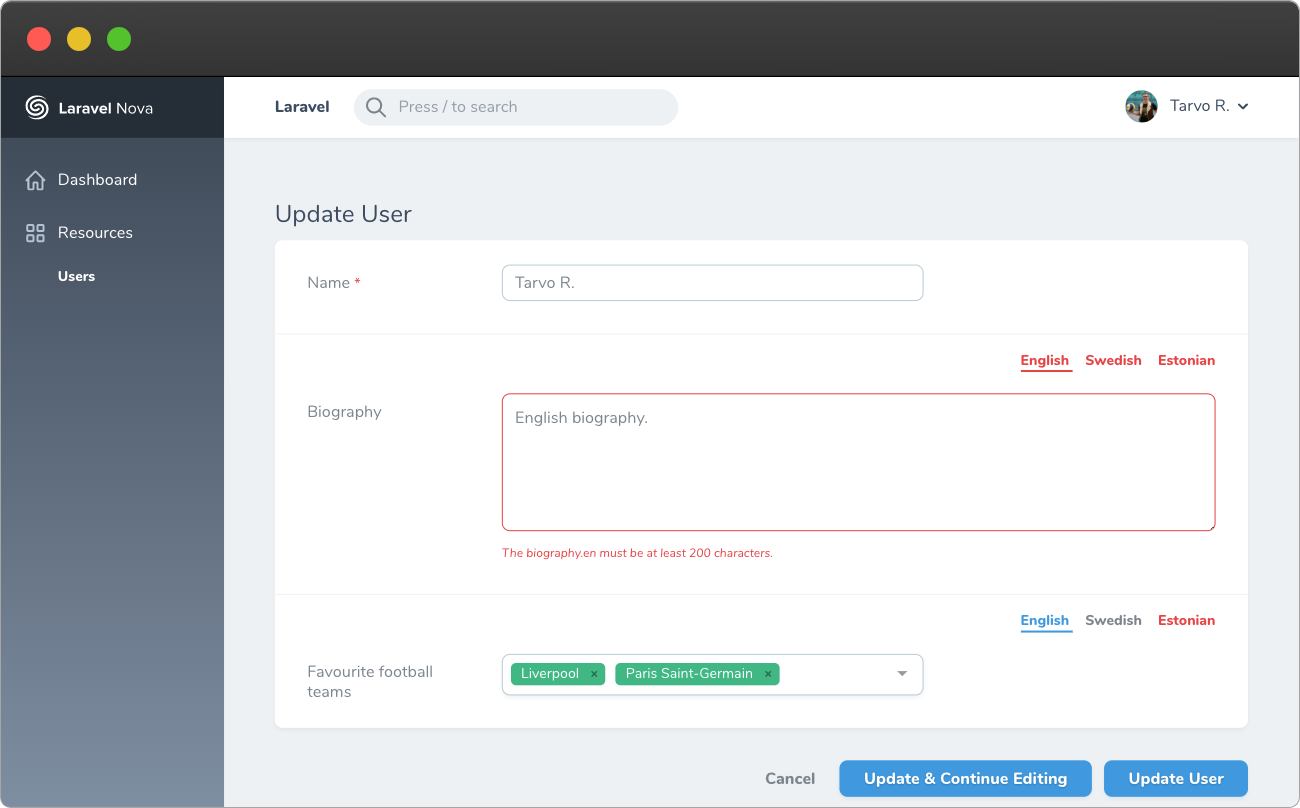Nova Translatable
This Laravel Nova allows you to make any input field spatie/laravel-translatable compatible and localisable.
Requirements
laravel/nova: ^2.9 || ^3.0spatie/laravel-translatable: ^4.0 || ^5.0 || ^6.0
Features
- Supports almost all fields (including third party ones)
- Supports default validation automatically
- Simple to implement with minimal code changes (after
spatie/laravel-translatablesupport) - Locale tabs to switch between different locale values of the same field
- Double click on a tab to switch all fields to that locale
- Supports nova-settings package
Known non-working fields
ImageandFile- Workarounds:
- optimistdigital/nova-media-field
- or any library that uploads images/files using XHR
- Workarounds:
Limitations
- The following methods can not be used, as this package uses them internally:
resolveUsingfillUsingdisplayUsing(might be fixed eventually)
Screenshots
Installation
Firstly, set up spatie/laravel-translatable.
Install the package in a Laravel Nova project via Composer:
# Install nova-translatable
composer require optimistdigital/nova-translatable
# Publish configuration (optional, but useful for setting default locales)
php artisan vendor:publish --tag="nova-translatable-config"Usage
Call ->translatable() on any field, like so:
// Any Nova field
Text::make('Name')
->rules('required', 'min:2')
->translatable(),
// Any third-party input field
Multiselect::make('Football teams')
->rules('required')
->translatable(),
// Optionally pass custom locales on a per-field basis
Number::make('Population')
->translatable([
'en' => 'English',
'et' => 'Estonian',
]),Validation
It's possible to define locale specific validation rules.
To do so, add the ->rulesFor() on your field and the HandlesTranslatable trait to your Nova resource.
->rulesFor accepts array|string|callable locales and array|callable rules.
use OptimistDigital\NovaTranslatable\HandlesTranslatable;
class Product extends Resource
{
use HandlesTranslatable;
public function fields(Request $request)
{
return [
Text::make(__('Name'), 'name')
->sortable()
->translatable()
->rules(['max:255'])
->rulesFor('en', [
'required',
])
->rulesFor(['en', 'et'], function ($locale) {
return ["unique:products,name->$locale{{resourceId}}"];
}),
];
}
}In this example, rules will be added to the following values
max: name.*
required: name.en
unique: name.en & name.etConfiguration
You can define default locales for all the translatable fields in the config file. The config file can be published using:
php artisan vendor:publish --tag="nova-translatable-config"Fill other locales from config option
The configuration option fill_other_locales_from allows you to pre-fill other locales from just one locale. This requires the resources to also have the HandlesTranslatable trait.
One select for all fields on a page
If you don't want to display the locale select next to each field, you can set the display_type to none and add a OptimistDigital\NovaTranslatable\Fields\LocaleSelect field to your Nova resource. This will render a single select for all fields.
Edge cases
BelongsToMany allowDuplicateRelations corner-case
When using this field inside a BelongsToMany as a pivot field with ->allowDuplicateRelations() and you want to filter out exact matches using the NotExactlyAttached rule, use the BelongsToManyTranslatable field instead of the regular BelongsToMany.
Credits
License
This project is open-sourced software licensed under the MIT license.




